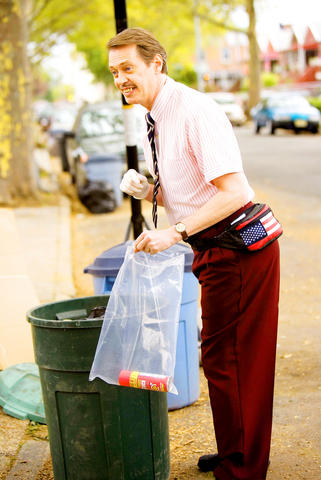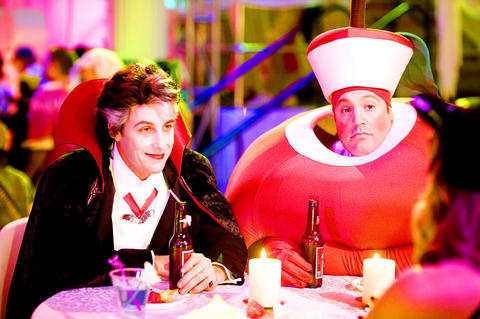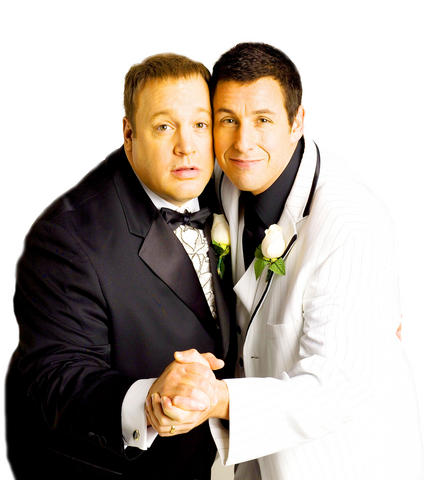Sporadically funny, casually sexist, blithely racist and about as visually sophisticated as a parking-garage surveillance video, the new Adam Sandler comedy, I Now Pronounce You Chuck & Larry, looks, sounds and moves like most Adam Sandler comedies. In other words, once again Sandler plays a regular Joe, here called Chuck, who stands around in the middle of the frame smirking and making fun of other people. Sometimes he makes you laugh, sometimes he makes you wince, though usually he makes you wonder how many times and in how many different permutations he will recycle his obnoxious Everyman.
Sandler's romantic foils have included Drew Barrymore, Emily Watson and Kate Beckinsale; here, the lucky lady is Chuck's bosom buddy and fellow fireman, Larry. As played by an agreeable, sympathetic Kevin James (from the sitcom The King of Queens), Larry comes equipped with a widower's broken heart, two young children and, like Chuck, a firm grasp on his heterosexuality. After he and Chuck experience a near-miss in a smoldering Brooklyn building, though, he decides that the best way to ensure his children's future is to marry his best friend, which is the one and only reason this movie was made. Heterosexuality can be played for comedy or tragedy, sure. But homosexuality? Honey, that's a scream.
That, in any event, is the approach taken by the director, Dennis Dugan, working from a screenplay credited to the bizarre triumvirate of Barry Fanaro, whose credits include years of working on the sitcom The Golden Girls, and Alexander Payne and Jim Taylor, who together wrote Sideways, Election and About Schmidt. It's next to impossible to reconcile Payne and Taylor, who excel in sharply honed, intelligent satire, with the crude laughs and nyuck-nyuck physical high jinks that characterize Chuck & Larry, much less the relentless barrage of idiotic jokes about gay men, most of which hinge on sex, or rather straight male fear of such sex, and involve groaning puns about backdoors and the like.

photos: courtesy of UIP
Fear of a gay planet fuels plenty of American movies; it's as de rigueur in comedy as in macho action. But what's mildly different about Chuck & Larry is how sincerely it tries to have its rainbow cake and eat it too. In structural terms, the movie resembles a game of Mother May I, in that for every tiny step it takes forward in the name of enlightenment (gay people can be as boring as heterosexuals), it takes three giant steps back, often by piling on more jokes about gay sex (some involving a priceless Ving Rhames). Into this mix add the stunningly unfunny Rob Schneider, who pops up brandishing buckteeth, glasses and an odious accent in apparent homage to Mickey Rooney's painful, misguided turn as the Japanese neighbor in Breakfast at Tiffany's.
I Now Pronounce You Chuck & Larry has been deemed safe for conscientious viewing by a representative of the Gay & Lesbian Alliance Against Defamation, a media watchdog group. Given the movie's contempt for women, who mainly just smile, sigh and wiggle their backdoors at the camera, it's too bad that some lesbian (and Asian) Glaad members didn't toss in their two cents about the movie. If Sandler dares speak in favor of gay love in Chuck & Larry - at least when it's legally sanctioned, tucked behind closed doors and not remotely feminine - it's only because homosexuality represents one type of love among men. Here, boys can be boys, together in bed and not, but heaven forbid that any of them look or behave like women.



The canonical shot of an East Asian city is a night skyline studded with towering apartment and office buildings, bright with neon and plastic signage, a landscape of energy and modernity. Another classic image is the same city seen from above, in which identical apartment towers march across the city, spilling out over nearby geography, like stylized soldiers colonizing new territory in a board game. Densely populated dynamic conurbations of money, technological innovation and convenience, it is hard to see the cities of East Asia as what they truly are: necropolises. Why is this? The East Asian development model, with

June 16 to June 22 The following flyer appeared on the streets of Hsinchu on June 12, 1895: “Taipei has already fallen to the Japanese barbarians, who have brought great misery to our land and people. We heard that the Japanese occupiers will tax our gardens, our houses, our bodies, and even our chickens, dogs, cows and pigs. They wear their hair wild, carve their teeth, tattoo their foreheads, wear strange clothes and speak a strange language. How can we be ruled by such people?” Posted by civilian militia leader Wu Tang-hsing (吳湯興), it was a call to arms to retake

This is a deeply unsettling period in Taiwan. Uncertainties are everywhere while everyone waits for a small army of other shoes to drop on nearly every front. During challenging times, interesting political changes can happen, yet all three major political parties are beset with scandals, strife and self-inflicted wounds. As the ruling party, the Democratic Progressive Party (DPP) is held accountable for not only the challenges to the party, but also the nation. Taiwan is geopolitically and economically under threat. Domestically, the administration is under siege by the opposition-controlled legislature and growing discontent with what opponents characterize as arrogant, autocratic

When Lisa, 20, laces into her ultra-high heels for her shift at a strip club in Ukraine’s Kharkiv, she knows that aside from dancing, she will have to comfort traumatized soldiers. Since Russia’s 2022 invasion, exhausted troops are the main clientele of the Flash Dancers club in the center of the northeastern city, just 20 kilometers from Russian forces. For some customers, it provides an “escape” from the war, said Valerya Zavatska — a 25-year-old law graduate who runs the club with her mother, an ex-dancer. But many are not there just for the show. They “want to talk about what hurts,” she